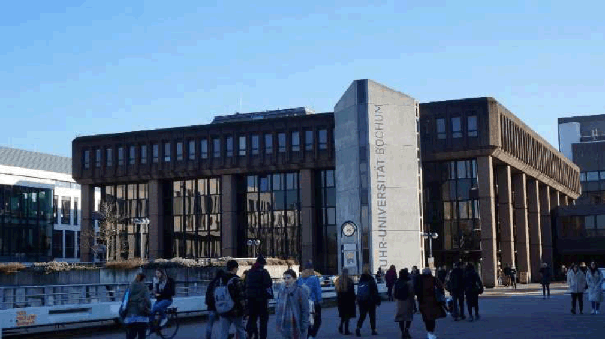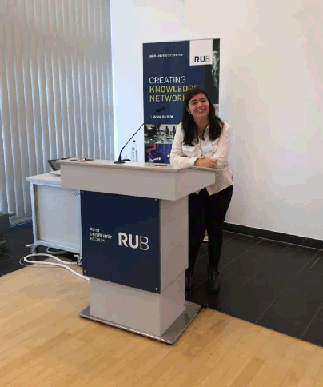Ruhr Universität Bochum (RUB) campus in Bochum – Germany.

Legend: Authors’ own source
Letícia Nunes Campos1, Sura Wanessa Santos Rocha2
doi: http://dx.doi.org/10.5195/ijms.2021.992
Volume 9, Number 3: 237-238
Received 26 03 2021: Rev-request 05 05 2021: Rev-recd 31 05 2021: Accepted 09 06 2021: Publication 08 07 2021
Global health (GH) is a field of study, research, and practice that prioritizes the improvement of health outcomes and the achievement of health equity worldwide.1 Nevertheless, disparities exist between the Global North and South, a geopolitical and economical conceptualization that respectively stands for high-income countries (HICs), such as from Europe and North America, and low- and middle-income countries (LMICs), such as from South America, Africa, and Asia.1 Global South countries struggle to train and retain good researchers and practitioners to address local, regional, and GH challenges.2 In comparison to other countries, Brazil has sent forth several scientists abroad with no mechanisms to incorporate these research skills upon return, which aggravates the brain drain phenomenon, characterized by researchers’ substantial emigration usually to HIC settings.3
Therefore, it is necessary to train a new generation of Global South scientists adequately, aiming to develop these LMICs’ research capacity that accounts for research workforce, structures, processes, and procedures.2,3 In this regard, international student mobility fosters collaboration among institutions and promotes GH education while building capacity.4 Student exchanges help share best practices, which enhances research quality and efficiency.4 Consequently, it is vital that exchange opportunities in a Global North-South format contain a framework that ensures bilateral collaboration to promote research balance.
The International Federation of Medical Students’ Associations (IFMSA) operates the largest student-run medical exchange program worldwide, providing research exchange programs since 1991.5 The program depends on the workflow established by participating IFMSA member organizations that are responsible for defining their requirements and application process. To ensure a high-quality exchange program and endorsement from stakeholders, IFMSA promotes activities and materials focused on educational and academic opportunities.5 Hence, this article aims to report my experience in IFMSA research exchange as a Brazilian medical student from the Global South, in Germany, a Global North country.
The 4-week research exchange occurred in February of 2020 at the Medical Faculty of Ruhr Universität Bochum in Bochum, Germany (Figure 1). I worked in the neurophysiology department, associated with the University International Graduation School of Neurosciences, where I assisted with research projects that focused on investigating the mechanisms underlying memory and its dysfunction.
Figure 1.Ruhr Universität Bochum (RUB) campus in Bochum – Germany.

All activities were in English and under the supervision of laboratory technicians and students pursuing their Master's and Doctorate degrees. In terms of assessment, my work was detailed in a logbook, shared with supervisors, and regularly discussed for providing feedback and tracking progress concerning my professionalism, collaboration, management, communication, and erudition skills. I was surprised with this rating system since my summative and formative assessments, most as multiple-choice exams, centered on theoretical contents from foundational sciences and organ systems by my medical school.
This exchange program allowed me to improve my skills in microtomy, histopathology, immunohistochemistry, and immunofluorescence. Although I was familiar with the techniques and paraffin wax histological slides due to my experiences in Brazil, the department had stains and cryostats that are financially inaccessible for my original institution. Moreover, I attended two of the department's journal clubs and lectures provided by the graduate school to first-year doctoral students. These educational opportunities enabled me to learn valuable skills including the critical appraisal of journal articles, project management and development, framing a research question, and a deeper understanding of bioethical issues. I also attended an International Neurosciences Conference about extinction learning, which occurred at Ruhr Universität Bochum. This was a topic that I was not acquainted with before my exchange, neither through curricular nor extracurricular activities (Figure 2).
Figure 2.Exchange student participating in the Extinction Learning conference held in the Ruhr Universität Bochum campus.

Participating in this research exchange allowed me to improve my cultural awareness, to become sensitive to the similarities and differences between cultures. Regarding the German scientists, I noticed that they were more willing to adopt an open and cooperative approach to research. Such perceptions may have occurred to me since obtaining resources and infrastructure is laborious in my original institution, generating a certain skepticism on sharing materials and methods with other researchers.
As a result of such a positive experience, back in Brazil, I decided to adopt a collaborative role and share all valuable learning experiences, methods, and protocols that would be useful for my primary group. Consequently, I noticed that the team improved the outputs from histopathology and immunohistochemistry, techniques, benefiting our lab projects.
Furthermore, the German exchange team organized social programs outside of work in the lab. For example, I have attended parties, museums, expositions, theater, and local festivities. Through these exposures, I got accustomed to the country's history, language, food, and various ways that the German people express their culture. Consequently, the social programs outside the lab made me communicate and interact more effectively with the neurophysiology department peers.
International student mobility has been associated with benefits at an individual level by stimulating cultural awareness and catalyzing personal and professional development.6 Additionally, exchanges are valuable from a medical student perspective, since it allows the student to experience the reality and challenges of the research settings to improve GH education.4,6 Student mobility plays a crucial role in research education since many medical trainees are interested in research while participating in short-term experiences in GH.7 In the long-term, exchanges are a cost-effective and sustainable alternative to stimulate and develop health-related research in the Global South, due to soft and scientific skills’ development.8
During the exchange experience, I learned through being exposed to different environments, people, and scientific methodologies. This resulted in the acquisition and improvement of research-related skills including research design and implementation, ethics, and professionalism. Whereas the language of training can be a barrier to student exchange mobility,6 I am proficient in English, the language spoken at Ruhr Universität Bochum. Being fluent in English was crucial to this exchange experience, allowing me to participate in research project discussions, learning opportunities and develop friendships with laboratory staff and other students at the university. Since this article focuses on the experience of a single medical student, further research should investigate the impact of medical student exchange programs on building research skills and capacity on a larger scale.
Taking the reported experience into account, student exchange mobility in a Global North-South format benefits medical trainees by improving research skills. International exchange programs teach skills such as research methodology, ethics, professionalism and promote collaborative environments.
We thank the Fundação de Amparo à Ciência e Tecnologia do Estado de Pernambuco (FACEPE) for intellectually supporting this paper. We also thank the International Federation of Medical Students’ Associations of Brazil (IFMSA Brazil) and Bundesvertretung der Medizinstudierenden in Deutschland (bmvd) for the provision of the research exchange program and for their support throughout this process. Finally, we thank Alexandra M. Buda for contributing to the review and edition of this article.
The Authors have no funding, financial relationships or conflicts of interest to disclose.
Conceptualization: LNC, SWSR. Methodology: LNC, SWSR. Supervision: SWSR. Visualization: LNC. Writing – Original Draft Preparation: LNC. Writing – Review & Editing: SWSR.
1. Kim JU, Oleribe O, Njie R, Taylor-Robinson S. A time for new north-south relationships in global health. Int J Gen Med. 2017 Nov 7;10:401–8.
2. Reidpath DD, Allotey P. The problem of “trickle-down science” from the Global North to the Global South. BMJ Glob Heal. 2019 July 24;4(4):2–4.
3. Rev Fapesp. O impacto da circulação de cérebros. Available from: https://revistapesquisa.fapesp.br/2019/09/05/o-impacto-da-circulacao-decerebros/. Last updated September 12, 2019; cited May 3, 2021
4. Mews C, Schuster S, Vajda C, Lindtner-Rudolph H, Schmidt LE, Bösner S, et al. Cultural competence and global health: Perspectives for medical education –Position paper of the GMA committee on cultural competence and global health. GMS J Med Educ. 2018 Aug 15;35(3):1–17.
5. Pierre M, Moreno V, Challita C, Trejo A, Dirul D, Estokova J. Manual Academic Quality in SCORE. 1st ed. Copenhage: International Federation of Medical Students' Associations (IFMSA); 2020.
6. Brown M, Boateng EA, Evans C. Should I stay or should I go? A systematic review of factors that influence healthcare students’ decisions around study abroad programmes. Nurse Educ Today. 2016 April 28;39:63–71.
7. White MT, Satterfield CA, Blackard JT. Essential competencies in global health research for medical trainees: A narrative review. Med Teach. 2017 May 14;39(9):945–53.
8. Franzen SRP, Chandler C, Lang T. Health research capacity development in low and middle income countries: Reality or rhetoric? A systematic meta-narrative review of the qualitative literature. BMJ Open. 2017 Jan 17;7(1).
Letícia Nunes Campos, 1 Medical student. Faculty of Medical Sciences; Immunopharmacology Laboratory, Universidade de Pernambuco, Recife-PE, Brazil.
Sura Wanessa Santos Rocha, 2 Professor at the Institute of Biological Sciences. Immunopharmacology Laboratory; Institute of Biological Sciences, Universidade de Pernambuco, Recife-PE, Brazil.
About the Author: Letícia Campos is currently a 4th year medical student at Universidade de Pernambuco, a six-year program. She is a member of the university's immunopharmacology laboratory, and recipient of the scientific initiation scholarship program the Fundação de Amparo a Ciência e Tecnologia de Pernambuco.
Correspondence: Letícia Campos. Address: Av. Gov. Agamenon Magalhães - Santo Amaro, Recife - PE, 50100-010, Brazil. Email: leticia.campos@upe.br
Editor: Francisco J. Bonilla-Escobar Student Editors: Purva Shah, Nguyen Tran Minh Duc, Madeleine Jemima Co Copyeditor: Adam Urback Proofreader: Madeleine Jemima Cox Layout Editor: Anna-Maria Chantaliyska Process: Peer-reviewed
Cite as: Campos LN, Rocha SWS. Student Mobility and Research Capacity: A Global Health Experience. Int J Med Students. 2021 Jul-Sep; 9(3):237-9.
Copyright © 2021 Letícia Nunes Campos, Sura Wanessa Santos Rocha
This work is licensed under a Creative Commons Attribution 4.0 International License.
International Journal of Medical Students, VOLUME 9, NUMBER 3, September 2021